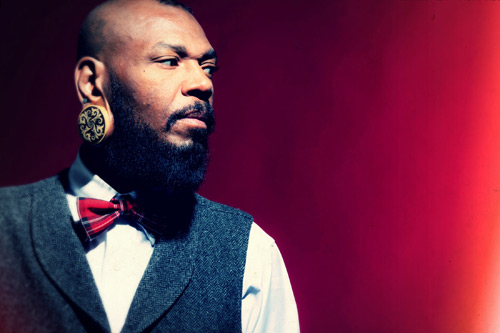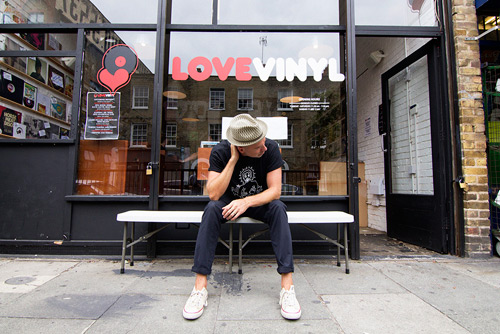On Saturday 01 November, we host the latest edition of our Ministry of Sound residency, with an incredible array of talent controlling the venue’s various DJ booths.
Defected regulars Franky Rizardo, Sam Divine and Simon Dunmore line-up in Ministry’s 103, while in The Box, Yoruba kingfish Osunlade promises deep, spiritual dance goodness; much the same as Detroit sophisticate Terrence Parker – about to re-release his acclaimed Life On The Back 9 album via Defected. The Box’s monstrously good line-up is completed by versatile Belgian sensations FCL and Classic head honcho Luke Solomon. And there’s time, too, for Parker to duck across to the For The Love Of House controlled Loft for a separate set of ‘classic’ house, with support from Greg Sawyer and Simon Dawson.
This may be Defected’s party, but all of its Box stars have thriving labels of their own and it’s fair to say that the unique spirit of those enterprises can also be expected to air during the evening. The bubbling cauldron of so many top-draw artists and imprints should make for some spellbinding dancefloor entertainment.
For a better sense of the treats in store, here’s a rundown of Yoruba, We Play House and Classic – the labels founded by Osunlade, FCL and Luke Solomon respectively.
Yoruba Records – Osunlade

Dance ‘shaman’ Osunlade founded Yoruba in 1999 after growing frustrated with the ruthless, money-driven vagaries of the mainstream LA music scene, and discovering Ifa, a system of traditional spiritualism and healing distilled from the Yoruba people in West Africa. Yoruba was driven forwards by Osunlade’s powerful faith and musical versatility, leading to a dazzling discography of releases covering all elements of the soul-dance spectrum.
That impeccable discography has further diversified throughout the Noughties. And Osunlade’s relocation to Greek island Santorini in 2006 has provided him with the kind of peaceful, tranquil environment in which to further open his mind, fully embrace the world’s natural energies and channel his unique experiences back into Yoruba.
Yoruba’s first release, in 1999, was Osunlade’s own EP ‘Natives Tongue’ which beautifully reflected its label’s future blueprint, combining World influences (African drums) and deep house flow in referential style. A slew of similarly calibrated releases followed, but each from different artists with clearly distinct visions – the likes of Nadirah Shakoor, Erro, Djinji Brown, Santos, Afefe Iku, Boddhi Satva, Nomumbah, Spyro and KB.
There have been plenty of highlights. Osunlade’s own albums on the label have ranged majestically from deep, ancestral house (Pyrography, 2005, officially his last ‘house’ album) to fluid funk-soul (Peacock, 2014, released this month). Afefe Iku’s mesmeric 2007 single ‘Bodydrummin’ skilfully interweaved tribal chant and percussion around thrusts of deep tech, whilst six years prior, Erro’s ‘Don’t Change’ offered a distinguished nod to Stevie Wonder in its emotive sweep of acoustic soul-house bliss. Joey Negro would get his mitts on it a year later to add further winning disco-gloss via several quality remixes.
Elsewhere, Nadirah Shakoor offered velvety afro-soul goodness on ‘Just A Breath Away’ (2005), Boddhi Satva dropped slow-burn 4-4 magic on his ‘Satva Varti EP’ (2007) – a precursor to his subsequent global explosion – and Santos landed the aptly titled ‘Crossroads’ (2011) – skilfully splicing everything from Flamenco, whistle song, tech hustle and smoky jazz trumpet. Amazing.
Yoruba is centred firmly on artists, gloriously distinguishing itself from the homogenized masses touting identikit beats at peak-time house floors and, in turn, maintaining its reputation as one of the most influential independent labels in clubland. With over 300 releases to its name now, Yoruba continues to pride itself on strong, transformative songwriting and uncompromised production. Its most recent releases from Osunlade, Drala and Aussie Mike Steva – with a savvy new take on deep house rhythm – suggest the future is ultra-bright.
Classic Music Company – Luke Solomon

Solomon co-founded the ground-breaking Classic Records with Chicago house legend Derrick Carter in 1995. Famously the imprint counted down its releases from 100, promising to shut down once ‘zero’ was reached. But new material continued to creep past that milestone, hit in 2005, via a plethora of astutely selected re-masters, remixes and brand new edits of former back catalogue glories. And then Carter and Solomon moved beyond their ‘redux’ vibin’ to present bold new creative – Classic was reborn, and in much the same innovative, brazen house mould as before.
Where to start? Well, debut sampler ‘Seasons’ is as good a place as any, a standout twelve mixing experimental electronic dance with cool downtempo from a roster of artists including Red Nail, Purple Haze and Tone Theory. Classic’s maverick marker was laid down, the label soon progressing to early releases by DJ Sneak, Matthew Herbert, Tiefschwarz and Metro Area, and building an emphatic head of steam.
Classic has continually moved dancefloors but, crucially, in unexpected ways – the secret to its success. Solomon and Carter have steered their ship without outside influence, simply absorbing the sounds and ideas that excite them and relaying effciently them through the label. Hence DJ Sneak’s rampant success with Teddy Pendergrass-sampling, disco-house bomb ‘You Can’t Hide From Your Bud’, released in 1997, was followed by the moody quirk of Gemini’s ‘In My Head EP’ (1998) and loose, lounge shuffle of Rob Mello’s ‘Happiness’ (1999). Beyond that came Isolee’s revolutionary jazz-glitch jam ‘Beau Mot Plage’ (1999), the kind of record to launch a thousand micro-house scenes, and Brooklyn duo Metro Area’s slick, yet angular nu-disco – as typified by 2001 12” ‘Pina’. This was dance music, beautifully and soulfully deconstructed eons before the likes of Soul Clap and Wolf + Lamb.
Classic’s countdown to release ‘zero’ took in electrifying idiosyncratic house productions from Tiefschwarz, Greenskeepers, Brett Johnson, Justin Martin and, naturally, Carter and Solomon themselves. And, on the other side of ‘zero’ it welcomed released by scene luminaries Ewan Pearson and Roy Davis Jr, not to mention Solomon’s eclectic alias The Digital Kid. Most recently – extensive re-edit and re-issue work aside - the label has overseen the poignant (Solomon and Jon Marsh’s moving, yet uplifting 2012 tribute to departed DJ friend Kenny Hawkes, ‘Lonely Dancer’), the deliriously wigged-out (Mathew Styles’ 2013 EP ‘Out All Night’) and truly special (the future-soul classicism of Seven Davis Jr’s ‘Friends EP’, released this year).
The latest release sees London duo krankbrother making their label debut, with an impressive two-track EP ‘One Eyed Jack’s'. Classic, it seems, will be remaining an essential imprint for the foreseeable future.
We Play House – FCL

The arrival of We Play House, in 2008, pre-dates the arrival of Belgian powerhouse club duo FCL – Bart Van Neste and Nicolas Geysens – by a year. It was Neste, as alias Red D, who established the label, seeking to establish a platform for the stirring sounds of his close friend Geysens, working under the prolific solo alias of San Soda. The name said it all – We…Play…House. Neste was attempting to return to dance music’s pure roots – a time when house was a name for all sorts of electronic grooves and moves. Such refreshing context saw We Play House quickly snowballing to incorporate the releases of others. In no time at all the label was global, and for all the right reasons.
FCL’s staggering success over the past five years says much about We Play House’s overall direction. Hit single ‘It’s You’, released in 2012, may have guaranteed FCL greater mainstream attention but that record’s shrewd avoidance of tag or pigeon hole (let’s call it minimal soul-dance as a loose reference point) has allowed the duo to progress its plan as it wishes – without the burden of marginalising expectation. And that plan, like that for We Play House, is wide-ranging.
Early label releases from San Soda (notably ‘The Limited Gear’ and ‘The Super Pim Pam Pet’ EPs) dished old-school US jack next to garage chop, dub house and melodic electronic swirl, paving the way for equally assured entries from Reggie Dokes (complex looping ‘n’ layering), Russ Gabriel (supremely funky 4-4; sax-y cut ‘Mister Din’ a particular favourite) and DJ Yellow (shimmering electronic torch songs and epic synth dreamscapes) – house, as intended, right across the board.
We Play House’s roster has only diversified further in subsequent years, retaining the original house thrusts of mainstays Gabriel, Soda and, of course, FCL (‘Let’s Go’ and this year’s sultry, bass-edged ‘Can We Try’, featuring regular vocalist cohort Lady Linn, alongside the obvious ‘It’s You’) alongside incisive work from Metrobox, Art Of Tones, Kiani & His Legion (as licensed by DFTD) and Nacho Marco – the latter grouping further pushing the house envelope by mixing light and dark, old and new. Art Of Tones’ (AKA Gallic groove veteran Llorca) 2013 funky-ass release ‘Take Me Higher’ is a recent, particularly lofty high point.
Van Neste has already promised us new FCL and San Soda material in the near future, and the smart thinking would be that some (or all) of this will end up on We Play House. Regardless, the lasting influence of those acts, and, indeed, of Red D, will undoubtedly catalyse new advancements at the label – both in terms of repertoire and overall creative direction. The ‘House’ is jumping, as revellers will undoubtedly witness at Ministry come November
Words: Ben Lovett
Osunlade, FCL and Luke Solomon play Defected In The House at London’s Ministry Of Sound 01 November – click for full line-up and tickets
Unfinished Business Volume 2 compiled & mixed by Luke Solomon is out 26 October (vinyl sampler and digital) on Classic Music Company
Peacock is out 19 October 2014 (CD and digital) on Yoruba Records
Defected In The House Amsterdam 2014 is out 12 October (3CD and digital) on Defected Records - order from iTunes and Amazon



